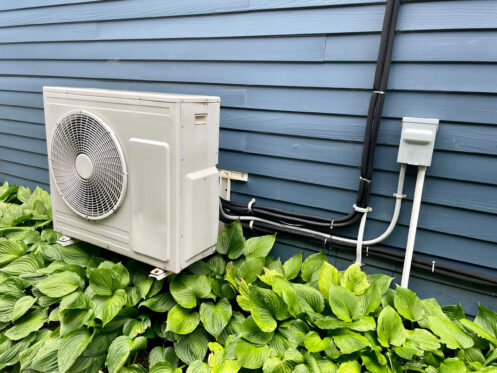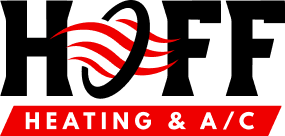How Long Do Heat Pumps Last?

Heat pumps are an increasingly popular HVAC system for homeowners. Much of this is attributed to their ability to provide heating and cooling for all year-round comfort. However, before you invest in any new system for your home, it’s important to understand more about it, such as how long it will last.
What Are the Components of a Heat Pump?
A heat pump is a specialized type of HVAC system that uses refrigerant to transport heat both indoors and outdoors. In the summertime, a heat pump will transport heat from inside of your home to the outdoors so that you can have a nice cool interior environment. However, when the cold winter season hits, a heat pump will successfully extract heat from the air outdoors and bring it into your home. This provides a nice warm environment for your family for the holiday season.
In general, three main components make up a heat pump. There’s going to be an indoor air handler unit that’s responsible for moving air throughout your ducting. In cases of a ductless mini-split heat pump setup, individual mini-split units will move the air throughout the room and into the unit. Inside all indoor air handler units and mini-split units will be an evaporator coil. Inside of the coil is a substance called refrigerant.
Refrigerant is the substance where heat is absorbed and transported either in or out of your home depending on the season. There are copper refrigerant lines that run from the indoor air handler units or mini-split units to the outdoor condenser unit. Inside the outdoor condenser unit is another coil known as the condenser coil. This outdoor unit houses blower components so that it can pull in air from the outdoors. It’s also home to the compressor pump that’s responsible for circulating refrigerant throughout the lines and coils in both indoor and outdoor units.
How Does a Heat Pump Operate?
To better understand how a heat pump works, let’s look specifically at how it cools your home in the summertime. The entire process starts at the indoor air handler unit or mini-split unit. The blower components will pull in air and pass it over the evaporator coil. The heat from the hot air will naturally move to the low-pressure refrigerant inside the evaporator coil. As this heat transfer process happens, excess humidity is removed from the air in the form of droplets on the evaporator coil.
As heat absorbs into the refrigerant, the pressure of the refrigerant increases and it turns into a gas. The compressor pump will circulate this refrigerant from the indoor unit to the outdoor condenser unit. At the condenser unit, air from the blower fan passes over the condenser coil. Heat from the refrigerant will move into the low-pressure outdoor air. This is why you’ll feel hot air coming off of your outdoor condenser unit during the summertime.
As heat moves out of the refrigerant, its temperature will drop and it will turn back into a liquid state. The compressor will continue to pump the refrigerant back towards the indoor unit. On its journey back inside, refrigerant will pass through an expansion valve. This valve will help reset the pressure of the refrigerant to ensure that it’s low and ready to absorb heat when it gets back to the evaporator coil. The refrigerant will circle throughout your entire heat pump setup until the indoor temperature reaches the set temperature on your thermostat settings.
When it comes to heating your home in the wintertime, this process happens in reverse. The refrigerant will absorb heat from the air outside as it passes over the condenser coil. The compressor will pump this refrigerant inside where your cold indoor air passes over the evaporator coil. Heat will be absorbed into your indoor air and dispersed so that it will be nice and warm inside your home.
How Long Does a Heat Pump Last?
Most air-source heat pumps have a life expectancy of around 15 years. How long your new heat pump lasts is going to depend on numerous factors like your climate, the amount of maintenance your heat pump receives, and so forth. To ensure that your heat pump lasts for as long as possible, we’re going to dive into a little bit more detail about what can affect its overall lifespan.
Regular Maintenance
Probably the most obvious factor that’s going to affect the lifespan of your heat pump is how much maintenance it receives. A heat pump should receive service in the spring and in the fall. This will ensure that it’s working in tip-top condition. Regular maintenance also prevents any major damage from occurring. A well-maintained heat pump is almost always going to last much longer than a heat pump that doesn’t receive regular maintenance service.
Filter Changes
Additionally, keep in mind that you need to keep up with regular filter changes to allow your system to operate at its peak. A dirty filter can cause system inefficiency and excessive wear and tear on the internal components of your heat pump system. Ducted heat pumps will need a filter change around every two to three months. Mini-split units will need their filters cleaned every month.
Clearing Outdoor Unit
The outdoor condenser unit is going to play a big role in the overall operating efficiency of your heat pump throughout the year. In order for it to function optimally, it needs to have at least three feet of open space on all sides. If you allow shrubbery or branches to grow too close to the outdoor unit, its airflow can be greatly restricted.
This will lead to reduced efficiency and an uncomfortable indoor environment. Furthermore, any debris that blows up against the unit can further restrict its functioning. If this debris makes it inside the unit, it will retain moisture and prematurely deteriorate the metal components inside the outdoor condenser unit.
A Note on Geothermal Heat Pumps
So far, we’ve been discussing air-source heat pumps that extract heat from the air. These are by far the most popular types of heat pumps on the market today due to their affordability and ease of installation. However, there is a second type of heat pump that is not as popular as the ground-source or geothermal heat pump. With the geothermal heat pump, there is an underground infrastructure put in place so that heat can be extracted from the soil instead of the air.
This allows for more reliable heat extraction when temperatures get below freezing, which is where traditional air-source heat pumps no longer operate. Geothermal heat pumps have an expected lifespan of around 20 years. Its underground infrastructure will typically last for around 25 to 50 years if properly installed.
Expert Heat Pump Service
Hoff Heating & AC offers expert heat pump service for the O’Fallon, MO area. We can also help with all your air conditioning, heating, indoor air quality, geothermal, ductless mini-split systems, and new construction needs. Simply call our office today to book a heating service consultation with one of our helpful HVAC technicians.

 Call Us Today
Call Us Today
